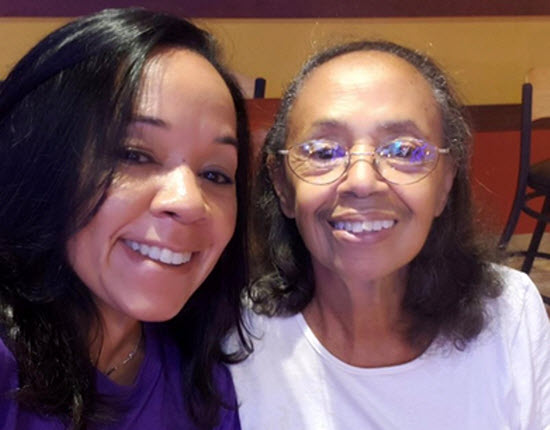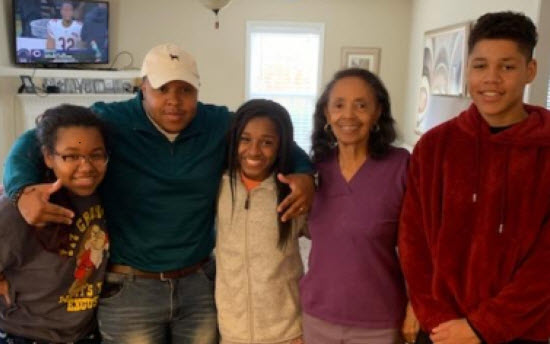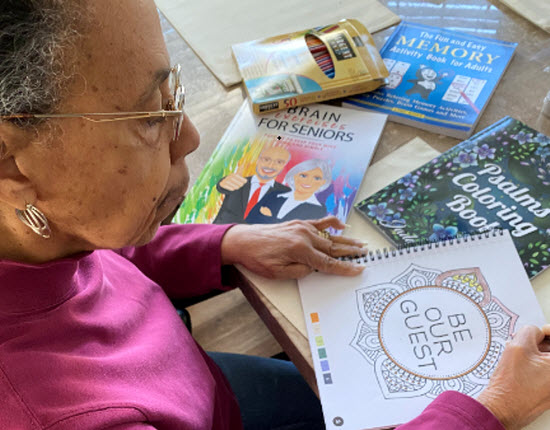2020-June-19
Did you know? You can share this story using the social media icons on the upper left. Use the hashtag #WeAreCisco. You can also rate or comment on the story below.
Fighting the Darkness of Alzheimer's
BY APRIL THORNTON · BUSINESS OPERATIONS MANAGER · UNITED STATES
Caregiving under normal circumstances is not easy. Caregiving during a pandemic is a different story altogether.
I know this firsthand, as a carer who is looking after my mom Linda Ann at home through this trying time.
My mom has always been rather reserved, enjoying quiet, solitary activities, such as knitting and puzzles. Three years ago, I began noticing changes in her habits and behaviors.
She would go to the store and forget what she already had at home, and when we visited her, we would find 10-12 bottles of soda. She would also have a few bags of onions and potatoes as if she was still cooking for her six younger siblings.

We were keen to respect her independence, but we were also worried based on the observation of hoarding. Our concern also stemmed from my father, who suffered from Alzheimer’s. He lived with the disease for nine years, confined to living in a convalescent home before succumbing to Alzheimer’s six years ago.
So, after observing my mother’s actions, I decided to contact a neuropsychiatrist. After assessing my mother, she had an MRI, and the results reflected the ministrokes she’s had. The strokes were the first diagnosis of dementia, a form of Alzheimer’s.
Alzheimer’s is a degenerative brain disease that is caused by complex brain changes following cell damage. It leads to dementia symptoms that gradually worsen over time. The most common early symptom of Alzheimer’s is trouble remembering new information since the disease typically impacts the part of the brain associated with learning first.
As Alzheimer’s advances, symptoms get more severe and include disorientation, confusion, and behavior changes. Eventually, speaking, swallowing, and walking become difficult. There is no way to prevent, cure, or even slow Alzheimer’s disease.
At that point, I was overwhelmed with understanding how this impacted her financially and personally, and how it would change my life.
After the diagnosis, I decided to move her to an “independent” adult residence because I felt that being among other elderly would assist in this journey. She was in the beginning stages of dementia, so assisted living was too premature.
After a year of living there, her dementia progressively got worse. The directors continued to call me daily. I decided was time to research assisted living facilities.
I took mom to see several assisted living facilities in the Wake County, North Carolina, area. I wasn’t quite sure what to look for, except I knew if I smelled urine when I walked in the door, that wasn’t the place.
The facilities we visited were nice, but based on the residence, the programs, and the cost, she still wasn’t ready. If I moved her to an assisted living facility, I thought if she believed I didn’t care it might kill her. I chose to move her in with me and my three kids.

At the time, my kids were in high school and middle school. We had a conversation about the importance of doing what’s right for our family. They were all a little hesitant because of how they’ve seen and dealt with her memory loss, but understood.
The first few months of settling into this new life were challenging, to say the least. My mom was used to living on her own and still wanted her independence and space. So, there were constant conversations of “untruths” just to appease her and prevent her from becoming upset.
I would tell her that she lived with us temporarily until her new building’s construction was complete. Of course, that was not true as I was buying time to figure out my next move. What do I do?
Becoming a caregiver has indeed been challenging. But, within my “new normal,” I registered her in an adult day center so that she could continue with social interaction. The day center keeps her mind active with engaging activities — mom absolutely looks forward to these days.
I also have the support of Cisco. The company not only offers time off to care for elderly parents, or children, but I can connect with other caregivers through Cisco’s Alzheimer’s support network.
The network has been very beneficial in communicating with other employees who are also challenged with caregiving. It allows me to be open and honest in a safe place.
I’ve also connected with Cisco’s Walk to End Alzheimer’s teams. I was able to raise over $1,500 in support of finding a cure to end Alzheimer’s. Being a part of the Walk to End Alzheimer’s community allowed me to meet even more individuals and expand my network.
Helpful recommendations to various agencies and steps for caregivers were offered by the Alzheimer’s Association.

During this pandemic, caregiving has gotten even more difficult. My mom’s day program isn’t available, and although I have tried to replicate these activities at home, it’s not the same. She has also been a flight risk during this time of being quarantined.
She was so used to attending her day center that she took it upon herself to walk to the day center — if no one else was going to take her, she would take herself. I installed a RingCentral doorbell to notify me if she tries to leave the house while I work upstairs in my office.
Along with the stress of constantly being on guard with her leaving, I also have two high schoolers at home, who do not receive the attention they deserve because I must spend time taking care of my mom.
Despite these challenges, I’m committed to advocating for my mom. Using Time2Give, I volunteer with the Alzheimer’s Association as a Congressional Team Member, where we fight for more day centers.
Though the greatest known risk factor for Alzheimer’s is increasing age, it isn’t a normal part of aging. And while most people with Alzheimer’s are 65 and older, younger-onset Alzheimer’s disease can affect people in their 40s and 50s.
At least 50 million people are believed to be living with Alzheimer's or other dementias, according to the United Nations. Last Saturday was the summer solstice and the longest day of the year — the day with the most light. People from across the world came together to fight the darkness of Alzheimer's through different fundraising activities.
I hope that sharing my story will help others coming to terms with this disease. Until Alzheimer ‘s affects you personally, it’s hard to understand the challenges it brings.
Related Links
Connect everything. Innovate everywhere. Benefit everyone.
Share your thoughts!
Log in to rate and commentShare your thoughts on the story here!